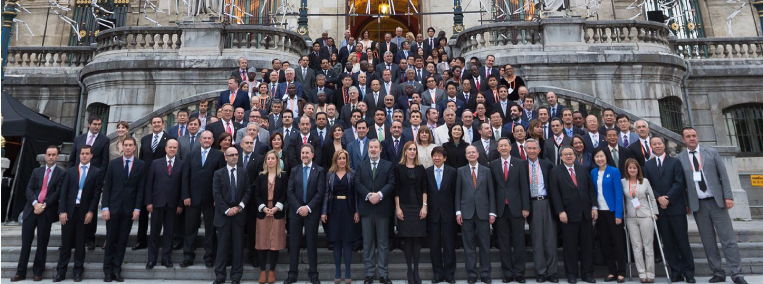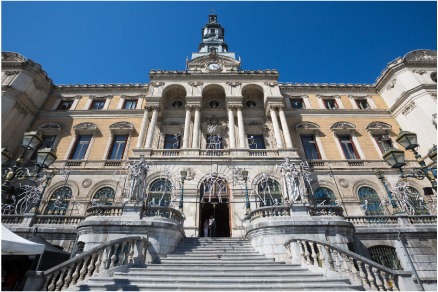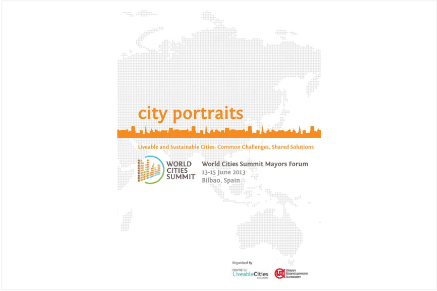Home >
ABOUT US >
Past Editions >
Mayors Forum 2013
Mayors Forum 2013

The fourth edition of the World Cities Summit Mayors Forum was held in Bilbao, Spain, from 13–15 June 2013. Themed “Liveable and Sustainable Cities: Common Challenges, Shared Solutions”, this was the first time that the Forum was held outside Singapore.
At the three-day event, 60 mayors and deputy mayors from 50 countries discussed experiences in addressing issues of urban planning, community engagement and economic resilience. Cities of Bilbao, Singapore, Cape Town, Fukuoka, Guadalajara, Cairo, Suzhou, Perth and Jakarta presented case studies, and special sessions with Moscow and Barcelona were held. Four thematic tracks discussed planning and governance, to economic competitiveness, environmental sustainability and improving the quality of life.
Leaders agreed that cities must gain dynamism before they can become resilient. While
economic and architectural solutions to common urban problems are often easy compared with political solutions, the main challenge lies in convincing the people to agree with the plans. Cities need to transform in order to stay relevant as urban change is often inevitable in the face of globalisation. Managing this transformation and change with sensitivity is key.
View the WCS Mayors Forum 2013 Report
HOST CITY

Bilbao was conferred the inaugural Lee Kuan Yew World City Prize in 2010 in recognition of its integrated and holistic approach towards urban transformation. Bilbao City Hall has been instrumental in regenerating and transforming the Spanish city from an obsolete and dilapidated industrial city into a knowledge-based economy.
Bilbao’s success is largely attributed to its integrated and holistic approach to achieve economic, social and physical transformations. Its emphasis on environmental clean-up, use of culture, internationalisation and design, major improvements to its infrastructure, as well as the restoration of its historic areas over almost three decades have successfully rejuvenated the city.
KEY INSIGHTS FROM THEMATIC DISCUSSIONS
Thematic Discussion 1: Integrated Planning & Dynamic Governance
- There are 3 key challenges to city administration: limited resources available, change in expectations, and a volatile environment due to globalisation.
- Integrated planning is about looking at the challenges that confront cities and devise a “Whole of Government” approach that crosses ministerial and departmental boundaries across agencies to serve the greater good.
- Cities often find ways to translate their desires into physical working plans, but this requires strong governance for eventual implementation.
- In volatile urban environments, city leaders will have to keep abreast by embracing a spirit of innovation and experimentation in their methodologies.
- To be experimental, city leaders need to gain a certain level of trust from the community. Transparent social engagement becomes critical in the equation.
- Tools of governance therefore need to find a good equilibrium, which can be supported by a strategic organisational structure.
Thematic Discussion 2: Building a Competitive Economy
- There is no magic formula; each city should know its strengths and set up the right education system to achieve economic competitiveness.
- Poor city designs create barriers to economic development. Planning objectives should meet people’s aspirations.
- Forging alliances with other cities within the country, rather than competing with them, can help cities grow.
- Leaders need to consult with the public and explain policies and gain their trust.
- Other than improving hardware (infrastructure) and software (community spirit, social bonding), cities should also focus on the “heartware” (making those who come to the city feel at home).
- Recognise the dynamic nature of competitiveness. What worked in the past may not do so in the future, hence the need for innovation and invention.
Thematic Discussion 3: Ensuring a Sustainable Environment
- Each city needs to have a long-term strategic plan with a focus of managing the environment.
- Creating awareness and making people feel proud will instil a sense of belonging.
- Legal framework and enforcement need to be in place for plans to be sustainable.
- Clean technologies and good environmental practices make money for the city in the long term.
- Planning, transparency and good governance are needed to balance priorities between growing businesses and sustaining the environment.
- Wanting to leave a legacy should drive cities to create and implement sound policies so that future generations can continue to benefit from a sustainable environment.
Thematic Discussion 4: Achieving a High Quality of Life
- Competitiveness, sustainability and social cohesion in cities can only be achieved by addressing integrated planning and dynamic governance, economic competitiveness and high quality of life, which are all connected and interdependent.
- Cities must have “diamonds”, or components of excellence that create conditions for job creation, identity and attraction of investors, young population and talent.
- Vision and branding sets cities apart from each other. A defined vision coupled with strong leadership enables a city to attract a younger population, creative class and other important talents because of its sense of identity and clear future direction.
- The integration of initiatives in topics of competitive economy and sustainable environment leads to the achievement of high quality of life.
- Cities need to be designed to address demographic change, such as ageing society or rapid population growth consequentially aggravating social, economic, and environmental challenges.
- Public housing could be a device to address urban decay, regenerate and refill city centres.
- Systematic public, private and non-profit sector partnerships are significant in generating affordable housing, jobs creation and welfare provision. Good business response is also enhanced if there are coherent, transparent and clear city policies.
